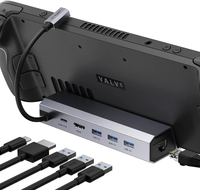Give your Steam Deck a sweet docking station to live in for 24% off this Cyber Monday
The JSAUX Steam Deck docking station is on sale at Amazon for $37.99, less than half what you'd pay for Valve's dock.

JSAUX Steam Deck Docking Station | 6-in-1 | HDMI 2.0 4K@60Hz | 3 USB-A 3.0 | $49.99 $37.99 at Amazon (save $12)
This slick 6-in-1 Steam Deck compatible docking station makes a nice home for your Deck, capable of charging it, connecting it to a monitor, providing 3 USB 3.0 ports and a gigabit ethernet port. It's already cheaper than Valve's own dock, and now it's on sale, too.
If you bought a Steam Deck this year you might be on the lookout for some Cyber Monday deals for Steam Deck accessories. It's highly unlikely Valve is going to have any sales on the Steam Deck itself in the near future, and that goes for it's $89 docking station, too.
Luckily JSAUX's got your back, with a Cyber Monday deal on Amazon for its 6-in-1 Steam Deck compatible docking station. Typically priced at $49.99, it was already cheaper than Steam's dock, but for Cyber Monday it's going for $37.99, which is 24% off. That's less than half of what the official dock would cost you, and I dare say Amazon will deliver it more quickly, too.
JSAUX's built a slick Deck docking station, with an HDMI 4K@60Hz output, a Gigabit ethernet input, three USB-A 3.0 ports and a USB-C charging port. The hub also functions as a stand, so you can play games or watch something without holding it in your hands or plopping it in your lap.
- We're curating all the best Cyber Monday PC gaming deals right here.
Just note the docking station isn't compatible with certain Steam cases, like JSAUX's own protective case with a kickstand, which makes it too thick to fit into the docking station. If you already have a case for your deck, you might have to remove it while it's in the docking station.
The biggest gaming news, reviews and hardware deals
Keep up to date with the most important stories and the best deals, as picked by the PC Gamer team.

Chris started playing PC games in the 1980s, started writing about them in the early 2000s, and (finally) started getting paid to write about them in the late 2000s. Following a few years as a regular freelancer, PC Gamer hired him in 2014, probably so he'd stop emailing them asking for more work. Chris has a love-hate relationship with survival games and an unhealthy fascination with the inner lives of NPCs. He's also a fan of offbeat simulation games, mods, and ignoring storylines in RPGs so he can make up his own.
Most Popular






